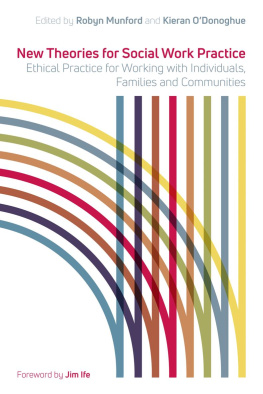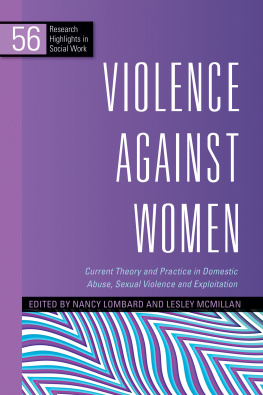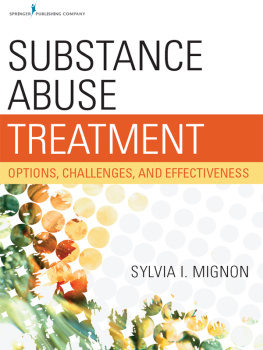Evidence-Based
Practice
With Women
Evidence-Based
Practice
With Women
Toward Effective Social Work Practice With Low-Income Women
Martha Markward
University of Missouri-Columbia
Bonnie Yegidis
University of South Florida-Tampa
Copyright 2011 by SAGE Publications, Inc.
All rights reserved. No part of this book may be reproduced or utilized in any form or by any means, electronic or mechanical, including photocopying, recording, or by any information storage and retrieval system, without permission in writing from the publisher.
For information:
 | SAGE Publications, Inc.
2455 Teller Road
Thousand Oaks, California 91320
E-mail:
| SAGE Publications India Pvt. Ltd.
B 1/I 1 Mohan Cooperative Industrial Area
Mathura Road, New Delhi 110 044
India
|
SAGE Publications Ltd.
1 Olivers Yard
55 City Road
London EC1Y 1SP
United Kingdom | SAGE Publications Asia-Pacific Pte. Ltd.
33 Pekin Street #02-01
Far East Square
Singapore 048763 |
Printed in the United States of America
Library of Congress Cataloging-in-Publication Data
Markward, Martha J.
Evidence-based practice with women : toward effective practice with low-income women / Martha Markward, Bonnie Yegidis.
p. cm.
Includes bibliographical references and index.
ISBN 978-1-4129-7575-9 (pbk.)
1. Social work with women. 2. Psychiatric social work. 3. Poor womenMental health. 4. Poor womenMental health services. 5. Poor womenServices for. I. Yegidis, Bonnie L. II. Title.
HV1444.M37 2011
362.20425082dc22 2010026695
This book is printed on acid-free paper.
10 11 12 13 14 10 9 8 7 6 5 4 3 2 1
| Acquisitions Editor: | Kassie Graves |
| Editorial Assistant: | Courtney Munz |
| Production Editor: | Brittany Bauhaus |
| Permissions Editor: | Adele Hutchinson |
| Copy Editor: | Alan J. Cook |
| Typesetter: | C&M Digitals (P) Ltd. |
| Proofreader: | Laura Webb |
| Indexer: | Sheila Bodell |
| Cover Designer: | Gail Buschman |
| Marketing Manager: | Dory Schrader |
Foreword
D uring the past decade there has been growing recognition of and reliance on evidence-based practice in the professions of medicine, psychology, social work, nursing, criminal justice, and public health. Advances in health and mental health care have resulted in a complex system of care in which professionals are confronted on a daily basis with issues of time management. The application of technological advances such as evidence-based knowledge and intervention strategies places an increasing burden on the care provider. This burden is intensified in the provision of services to low-income women. Most providers of care to low-income women labor under stressful conditions of high caseloads, unmanageable paperwork, and poor working conditions. Their commitment to this work is indeed commendable.
In Evidence-Based Practice With Women: Toward Effective Practice With Low-Income Women, Markward and Yegidis provide a wealth of information on empirically supported assessments and intervention strategies for the practitioner working with low-income women and their families who are experiencing mental health disorders and substance abuse in their lives. The authors combine the empirical evidence with a discussion of environmental factors to provide a comprehensive and rich contextual framework for understanding and providing a comprehensive and effective approach to treatment.
As the authors note, for too long women, especially poor women, have received substandard careoften being treated for their physical symptoms with little attention to their emotional or mental health needs. This book is consistent with the mission and values of social work: to improve the biopsychosocial well-being of clients and to promote the provision of the best assessment and treatment possible for all persons, especially for those who are vulnerable, oppressed, or living in poverty.
This book will most certainly facilitate the training of practitioners and future practitioners in the provision of services to low-income women. Focusing on the most prevalent mental health issues facing women, the authors provide cross-cultural and cross-generational information on trauma and post-traumatic stress disorder, depression, generalized anxiety disorder, substance use and abuse, and borderline personality disorder. Data on prevalence and etiology, screening and rapid assessment approaches, and empirically based clinical practices are provided for each disorder. Additionally, each chapter contains discussion questions, case vignettes, and illustrative readings. In the final chapter, the authors provide a framework for advancing the agenda for more effective treatments for low-income women.
Markward and Yegidis have successfully compiled a remarkably comprehensive book that captures the required comprehensive nature of practice while simultaneously focusing on the specific knowledge and skill needed to provide high-quality mental health services to poor women. This book skillfully and seamlessly integrates research evidence, practice, and knowledge while simultaneously focusing on the environmental factors affecting the scope and prevalence of these disorders among poor women.
I am excited about this new book and its potential to move the field forward in providing a higher level of services to women and their families who are affected by mental illness and substance abuse. I have no doubt that current practitioners in the field will find this resource to be invaluable in their practice. This book will most certainly prove to be an extremely valuable resource for students, clinicians, supervisors, administrators, and educators. Markward and Yegidis have produced an extraordinary resource for all social workers and clinicians either working in the field or concerned with the plight of disadvantaged women.
Karen Sowers
Dean of the College of Social Work
University of Tennessee, Knoxville
Preface
R ecognizing that we are fortunate in the 21st century to have made significant gains in developing research knowledge that is applicable to women, we developed this book to share this knowledge with social work educators and students alike. The authors have both taught a womens course in social work practice at different universities and have had difficulty locating a single text specifically dedicated to empirically-based practice with poor women. In an attempt to limit the scope of the book, we decided to focus on the mental health problems most prevalent in this population of women across the nation and worldwide, and as such, we chose to address post-traumatic stress disorder (PTSD), depression, generalized anxiety disorder (GAD), substance use disorder (SUD), and borderline personality disorder (BPD). In doing so, we do not presume that other disorders are less important, but we believe that women in low-income families have higher rates of these disorders than do women in the general population. Evidence suggests that women in low-income families increasingly engage in abuse and misuse of substances as well.













